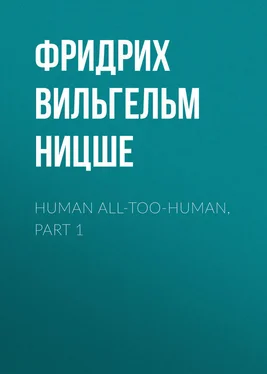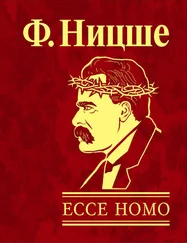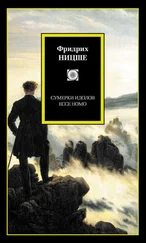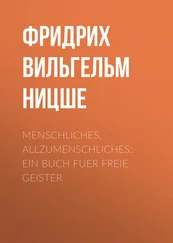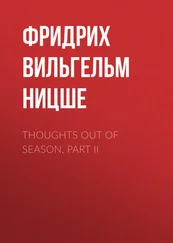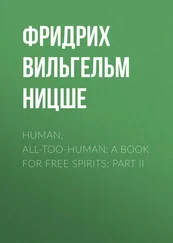Фридрих Ницше - Human All-Too-Human, Part 1
Здесь есть возможность читать онлайн «Фридрих Ницше - Human All-Too-Human, Part 1» — ознакомительный отрывок электронной книги совершенно бесплатно, а после прочтения отрывка купить полную версию. В некоторых случаях можно слушать аудио, скачать через торрент в формате fb2 и присутствует краткое содержание. Жанр: Философия, literature_19, foreign_antique, foreign_prose, на английском языке. Описание произведения, (предисловие) а так же отзывы посетителей доступны на портале библиотеки ЛибКат.
- Название:Human All-Too-Human, Part 1
- Автор:
- Жанр:
- Год:неизвестен
- ISBN:нет данных
- Рейтинг книги:4 / 5. Голосов: 1
-
Избранное:Добавить в избранное
- Отзывы:
-
Ваша оценка:
- 80
- 1
- 2
- 3
- 4
- 5
Human All-Too-Human, Part 1: краткое содержание, описание и аннотация
Предлагаем к чтению аннотацию, описание, краткое содержание или предисловие (зависит от того, что написал сам автор книги «Human All-Too-Human, Part 1»). Если вы не нашли необходимую информацию о книге — напишите в комментариях, мы постараемся отыскать её.
Human All-Too-Human, Part 1 — читать онлайн ознакомительный отрывок
Ниже представлен текст книги, разбитый по страницам. Система сохранения места последней прочитанной страницы, позволяет с удобством читать онлайн бесплатно книгу «Human All-Too-Human, Part 1», без необходимости каждый раз заново искать на чём Вы остановились. Поставьте закладку, и сможете в любой момент перейти на страницу, на которой закончили чтение.
Интервал:
Закладка:
Bad Habits in Reasoning. – The usual false conclusions of mankind are these: a thing exists, therefore it has a right to exist. Here there is inference from the ability to live to its suitability; from its suitability to its rightfulness. Then: an opinion brings happiness; therefore it is the true opinion. Its effect is good; therefore it is itself good and true. To the effect is here assigned the predicate beneficent, good, in the sense of the useful, and the cause is then furnished with the same predicate good, but here in the sense of the logically valid. The inversion of the sentences would read thus: an affair cannot be carried through, or maintained, therefore it is wrong; an opinion causes pain or excites, therefore it is false. The free spirit who learns only too often the faultiness of this mode of reasoning, and has to suffer from its consequences, frequently gives way to the temptation to draw the very opposite conclusions, which, in general, are naturally just as false: an affair cannot be carried through, therefore it is good; an opinion is distressing and disturbing, therefore it is true.
The Illogical Necessary. – One of those things that may drive a thinker into despair is the recognition of the fact that the illogical is necessary for man, and that out of the illogical comes much that is good. It is so firmly rooted in the passions, in language, in art, in religion, and generally in everything that gives value to life, that it cannot be withdrawn without thereby hopelessly injuring these beautiful things. It is only the all-too-naïve people who can believe that the nature of man can be changed into a purely logical one; but if there were degrees of proximity to this goal, how many things would not have to be lost on this course! Even the most rational man has need of nature again from time to time, i. e. his illogical fundamental attitude towards all things.
Injustice Necessary. – All judgments on the value of life are illogically developed, and therefore unjust. The inexactitude of the judgment lies, firstly, in the manner in which the material is presented, namely very imperfectly; secondly, in the manner in which the conclusion is formed out of it; and thirdly, in the fact that every separate element of the material is again the result of vitiated recognition, and this, too, of necessity. For instance, no experience of an individual, however near he may stand to us, can be perfect, so that we could have a logical right to make a complete estimate of him; all estimates are rash, and must be so. Finally, the standard by which we measure, our nature, is not of unalterable dimensions, – we have moods and vacillations, and yet we should have to recognise ourselves as a fixed standard in order to estimate correctly the relation of any thing whatever to ourselves. From this it will, perhaps, follow that we should make no judgments at all; if one could only live without making estimations, without having likes and dislikes! For all dislike is connected with an estimation, as well as all inclination. An impulse towards or away from anything without a feeling that something advantageous is desired, something injurious avoided, an impulse without any kind of conscious valuation of the worth of the aim does not exist in man. We are from the beginning illogical, and therefore unjust beings, and can recognise this ; it is one of the greatest and most inexplicable discords of existence.
Error About Life Necessary For Life. – Every belief in the value and worthiness of life is based on vitiated thought; it is only possible through the fact that sympathy for the general life and suffering of mankind is very weakly developed in the individual. Even the rarer people who think outside themselves do not contemplate this general life, but only a limited part of it. If one understands how to direct one's attention chiefly to the exceptions, – I mean to the highly gifted and the rich souls, – if one regards the production of these as the aim of the whole world-development and rejoices in its operation, then one may believe in the value of life, because one thereby overlooks the other men – one consequently thinks fallaciously. So too, when one directs one's attention to all mankind, but only considers one species of impulses in them, the less egoistical ones, and excuses them with regard to the other instincts, one may then again entertain hopes of mankind in general and believe so far in the value of life, consequently in this case also through fallaciousness of thought. Let one, however, behave in this or that manner: with such behaviour one is an exception amongst men. Now, most people bear life without any considerable grumbling, and consequently believe in the value of existence, but precisely because each one is solely self-seeking and self-affirming, and does not step out of himself like those exceptions; everything extra-personal is imperceptible to them, or at most seems only a faint shadow. Therefore on this alone is based the value of life for the ordinary everyday man, that he regards himself as more important than the world. The great lack of imagination from which he suffers is the reason why he cannot enter into the feelings of other beings, and therefore sympathises as little as possible with their fate and suffering. He, on the other hand, who really could sympathise therewith, would have to despair of the value of life; were he to succeed in comprehending and feeling in himself the general consciousness of mankind, he would collapse with a curse on existence; for mankind as a whole has no goals, consequently man, in considering his whole course, cannot find in it his comfort and support, but his despair. If, in all that he does, he considers the final aimlessness of man, his own activity assumes in his eyes the character of wastefulness. But to feel one's self just as much wasted as humanity (and not only as an individual) as we see the single blossom of nature wasted, is a feeling above all other feelings. But who is capable of it? Assuredly only a poet, and poets always know how to console themselves.
For Tranquillity. – But does not our philosophy thus become a tragedy? Does not truth become hostile to life, to improvement? A question seems to weigh upon our tongue and yet hesitate to make itself heard: whether one can consciously remain in untruthfulness? or, supposing one were obliged to do this, would not death be preferable? For there is no longer any "must"; morality, in so far as it had any "must" or "shalt", has been destroyed by our mode of contemplation, just as religion has been destroyed. Knowledge can only allow pleasure and pain, benefit and injury to subsist as motives; but how will these motives agree with the sense of truth? They also contain errors (for, as already said, inclination and aversion, and their very incorrect determinations, practically regulate our pleasure and pain). The whole of human life is deeply immersed in untruthfulness; the individual cannot draw it up out of this well, without thereby taking a deep dislike to his whole past, without finding his present motives – those of honour, for instance – inconsistent, and without opposing scorn and disdain to the passions which conduce to happiness in the future. Is it true that there remains but one sole way of thinking which brings after it despair as a personal experience, as a theoretical result, a philosophy of dissolution, disintegration, and self-destruction? I believe that the decision with regard to the after-effects of the knowledge will be given through the temperament of a man; I could imagine another after-effect, just as well as that one described, which is possible in certain natures, by means of which a life would arise much simpler, freer from emotions than is the present one, so that though at first, indeed, the old motives of passionate desire might still have strength from old hereditary habit, they would gradually become weaker under the influence – of purifying knowledge. One would live at last amongst men, and with one's self as with Nature, without praise, reproach, or agitation, feasting one's eyes, as if it were a play, upon much of which one was formerly afraid. One would be free from the emphasis, and would no longer feel the goading, of the thought that one is not only nature or more than nature. Certainly, as already remarked, a good temperament would be necessary for this, an even, mild, and naturally joyous soul, a disposition which would not always need to be on its guard against spite and sudden outbreaks, and would not convey in its utterances anything of a grumbling or sudden nature, – those well-known vexatious qualities of old dogs and men who have been long chained up. On the contrary, a man from whom the ordinary fetters of life have so far fallen that he continues to live only for the sake of ever better knowledge must be able to renounce without envy and regret: much, indeed almost everything that is precious to other men, he must regard as the all-sufficing and the most desirable condition; the free, fearless soaring over men, customs, laws, and the traditional valuations of things. The joy of this condition he imparts willingly, and he has perhaps nothing else to impart, – wherein, to be sure, there is more privation and renunciation. If, nevertheless, more is demanded from him, he will point with a friendly shake of his head to his brother, the free man of action, and will perhaps not conceal a little derision, for as regards this "freedom" it is a very peculiar case.
Читать дальшеИнтервал:
Закладка:
Похожие книги на «Human All-Too-Human, Part 1»
Представляем Вашему вниманию похожие книги на «Human All-Too-Human, Part 1» списком для выбора. Мы отобрали схожую по названию и смыслу литературу в надежде предоставить читателям больше вариантов отыскать новые, интересные, ещё непрочитанные произведения.
Обсуждение, отзывы о книге «Human All-Too-Human, Part 1» и просто собственные мнения читателей. Оставьте ваши комментарии, напишите, что Вы думаете о произведении, его смысле или главных героях. Укажите что конкретно понравилось, а что нет, и почему Вы так считаете.
